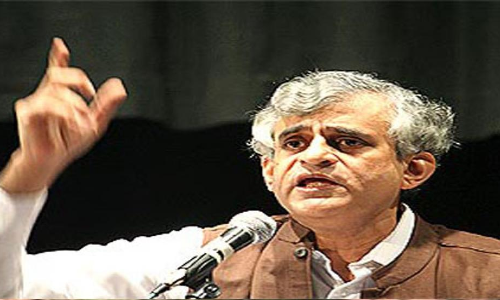Declare agriculture as a public service

Eminent Journalist and Ramon Magsaysay Award Winner Dr Palagummi Sainath stressed on urgent need to declare agriculture as a public service.Presenting a complex picture of distress in agriculture, rural economy, water crisis and mass migrations hitting the rural areas hard, Sainath said though drastic changes are happening in agriculture and villages affairs, media is not covering them adequately
15 million deserted agriculture during 1991-2011, says journalist Sainath
Hyderabad: Eminent Journalist and Ramon Magsaysay Award Winner Dr Palagummi Sainath stressed on urgent need to declare agriculture as a public service.Presenting a complex picture of distress in agriculture, rural economy, water crisis and mass migrations hitting the rural areas hard, Sainath said though drastic changes are happening in agriculture and villages affairs, media is not covering them adequately.
He said 75 per cent of people live in the rural areas. He said according to the CMS survey, national channels gave only 0.18 percent time slot on the prime time and national newspapers allocated only 0.61 percent of space for agriculture between 2012 -16. Even this, was mainly about reporting on agriculture ministry, departments, and activities of corporate agriculture conglomerates.
Delivering his address on the occasion of 52nd Foundation Day of the Press Club and M Hanumantha Rao Memorial Lecture, organised by the Hyderabad Press Club on Sunday, he said, ``What is worrying is that since the time of introduction of liberalisation process in the country, about 15 million farmers had deserted agriculture between 1991 -2011. At the same time, the number of farm labourers was growing.’’
Sainath said that cattle population is an important factor in the rural India and the cattle census till 1992 showed growth of all kinds of cattle wealth in the country. But, during 2002 to 2012, there is a drastic fall in cattle population and some of the native varieties are on the verge of extinction. At the same time, the exotic varieties or cross breeds with foreign varieties are on the raise. The native breeds which could withstand the local climatic conditions are gradually replaced with foreign varieties which could not stand to the local conditions.
Further, the poor and marginal farmers cannot afford to feed them resulting in losing cattle wealth to the rich farmers which eventually end up in the hands of the corporates, he said.
Sainath said these changes are due to the policy initiatives by the UPA and NDA governments. He asked the media to focus on such issues to create awareness among people.
He said that the demonetisation affected the supply of vegetables to the mid-day meals in the schools in Telangana and Marathwada in Maharashtra.
He said despite good spell of rains, several villages in the country are reeling under acute water shortage. For the first time in last 139 years, river Godavari had gone dry. This has happened because, the Nasik Municipal Corporation has been obstructing the ground water channels of the river at Ram Kund in holy city of Triambakeshwar in the name of religious tourism.
Ground water depletion, shortage of water, drought are all together building up a crisis like situation in India, which need to be focused by the media. These situations are triggering migrations from villages to urban and other areas where the civic bodies are already struggling hard to meet the growing demand for basic amenities to citizens.
Terming that the smart city concept could not be an effective solution to address the whole range of issues, Sainath proposed that structural changes in the focus of the media should be made so that they can highlight these issues, create awareness and lend its hand in figuring out the solutions.

